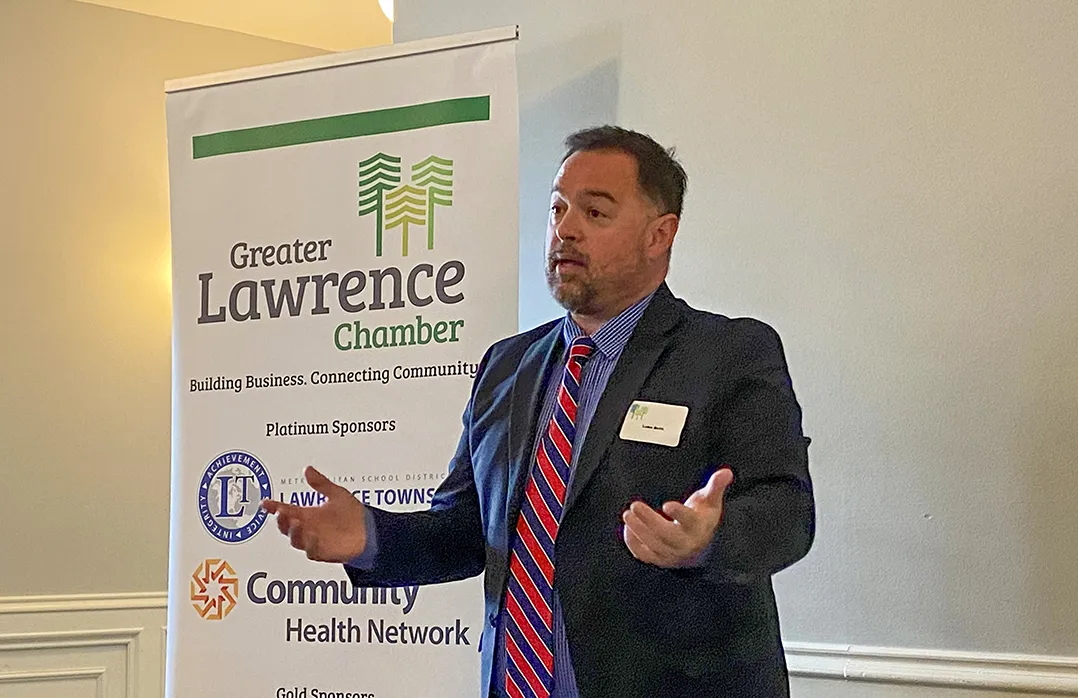A one-person state agency is tasked with helping state and local government officials maintain transparency and that one person has been doing the job for the past 11 years.
Luke Britt was appointed as the state’s nonpartisan Public Access Counselor in 2013 by then-Gov. Mike Pence. The Lawrence resident spoke about the state’s Open Door Law during the Aug. 20 Greater Lawrence Chamber of Commerce monthly luncheon.
Britt said his role has been to ensure that Hoosiers are informed about what their governments do with the public’s money.
“I draw a salary from the state; I have programming that I spend money on,” he said. “Every single dollar that I spend as a government official — that came from someone’s pocket who earned it and remitted it to the state in the form of a tax. In order that I be a good steward of that trust and of those resources, I make sure that my daily operations and what I do on a regular basis is transparent, so they know they’re getting the benefit of the bargain as far as what I do and also that I’m the right person for the job.”
Britt said that same transparency is important for all government agencies, state and local. One way he makes sure Hoosiers understand the Open Door Law is through outreach and education.
“Education is the No. 1 thing,” he said. “I love to go out and talk statewide to folks. I’ve been in (the) four corners of the state and everywhere in between. It is a joy and delight to talk to people face-to-face — that is kind of my wheelhouse. I make sure I get out about 50 times a year to various different communities and it’s a pleasure to be here in my hometown now.”
Britt also reviews and investigates complaints from citizens who believe the state’s Open Door Law has been violated by public officials. Most of the time, he said, his investigations show officials are doing what they’re supposed to do, but sometimes he issues an opinion of noncompliance.
To keep compliance problems at a minimum, Britt said he acts as a resource to not only the public but to public officials. The PAC website has resources about how officials should conduct meetings, what counts as a meeting and what records need to be made available to the public. He also is available by phone for people with questions about public access rules.
“I think people like it that they can call up a state agency and get the agency head really quickly,” he said. “About 55 percent or so of all those requests for assistance actually come from other public officials. So, that’s satisfying as well, knowing that they’re trying to do the right thing.”
Britt said transparency can seem like a burden to government officials because it takes time and effort, but it’s important to show the public how and why decisions are made.
“We just have to go through certain steps to make sure that everything’s on the up-and-up,” he said. “I tell elected officials, ‘Use this as an opportunity to show off a little bit, to show your voters and your constituents that, yeah, you made the right choice in putting me in office, and here’s why.’”
Britt said the Open Door Law applies to public meetings of government agencies. That includes not only city councils and school boards, but plan commissions, finance committees, zoning boards and any other government-related bodies.
“What the Open Door Law says is that anytime a majority or a quorum are discussing or deliberating or taking action on public business, then that discussion has to be open to the public,” he said.
There are a few exceptions. If a government body is discussing a lawsuit, for example, the Open Door Law allows members to meet in executive session. But that meeting still needs to be advertised so the public knows it’s happening.
A majority of a board could gather for a social event without notifying the public, he added, as long as they don’t talk about public business. Even then, though, it’s better to err on the side of caution and avoid any appearance of violating the Open Door Law.
Britt said public records also need to be easily accessible and agencies need to document pretty much everything they do. He noted that the public can access most local and state financial records through the Indiana Gateway portal, gateway.ifionline.org.
Alternatively, citizens can go to their city, town or county offices and request documents. Some documents are not public information, however, such as health records.
Britt said whenever there’s a question about whether to provide information or meet publicly, government should err on the side of transparency. He also had advice for the public
“Go to meetings, make public records requests, know your way around some of those online resources like Gateway, make sure that I’m held accountable, make sure that the city’s held accountable,” he said. “I think that when there’s apathy on the part of the constituency, that allows government to cut corners and to run amok a little bit.”
For more, visit in.gov/pac.




